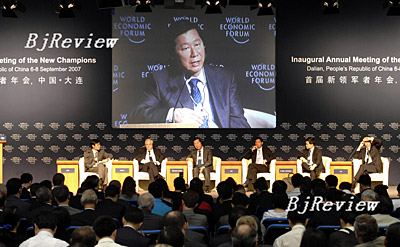
In 2006, China's capital markets rocketed up 183 percent, and the impressive growth has continued in 2007, with the Shanghai Composite Index already topping 5,000 points. But officials and experts have shown their concern that public enthusiasm will create economic bubbles.
China's central bank announced, for the seventh time this year, that it will raise the reserve requirement ratio for commercial banks by another 0.5 percentage points to 12.5 percent, starting September 25. Meanwhile, the central bank has raised interest rates four times this year. Will central bank measures to curb over-liquidity take immediate effect?
China has had GDP growth higher than 10 percent for the past four years, and during the first half of this year, GDP growth even soared to 11.5 percent. Faced with this buoyant economy, how should China solve environmental problems to maintain sustainable development?
At the World Economic Forum's Inaugural Annual Meeting of the New Champions 2007 held in Dalian on September 6-8, about one fifth of the meeting's topics were about China, and such questions as the above revolving around the Chinese economy were among the most frequently asked.
Capital markets outlook
"China's capital markets have made huge strides in the past few years," said Shang Fulin, Chairman of China Securities Regulatory Commission (CSRC), at a plenary session at the forum.
By the end of August, the number of listed companies on the domestic stock market reached 1,514, racking up a total market value of 23 trillion yuan ($3 trillion), and according to Shang. Market value/GDP ratio has exceeded 100 percent.
Shang mentioned that institutional investors have become a far bigger presence in trading, holding 44 percent of the shares in circulation, which are expected to lend greater stability to a market once ruled by speculative individual investors.
While the stock market has gone through fundamental changes, fund-raising environment has also turned better, Shang said.
Since the end of split-share reform in the second half of last year, more than 506.6 billion yuan ($68 billion) has been raised from the domestic securities market, 107 billion yuan ($14 billion) more than the total during the five years before the reform, according to Shang.
"Chinese corporate profitability is at record highs, so investor confidence has come back," said Fred Zuliu Hu, Managing Director of Goldman Sachs (Asia). He also said the economic strength partly explains the market's strong performance. Hu also considers the massive split-share reform initiated in 2005 as being an essential component in the market's rise.
In the future, Hu said, China will need a more robust domestic venture capital and private equity industry to help smaller local companies obtain capital. Banks will also be key in providing financing. "When it comes to changing the growth model from capital intensive to more innovative growth, the capital markets will play a big role in that process," said Hu.
Shang also said that the brokerage industry has gone through restructuring and stricter supervision. During the past three years, about 20 brokerage firms, accounting for one third of the total, were closed down.
Fang Xinghai, Deputy Director General of the Office for Financial Services of the Shanghai Municipal Government, suggested that more securities firms should publicly list to improve the health of domestic brokerages. Another move Fang believes might boost the competitiveness of local brokers is the granting full licensing to more foreign investment banks.
However, Shang said that only once the ongoing three-year restructuring of the brokerage industry is complete will the CSRC resume allowing Sino-foreign brokerage joint ventures.
| 